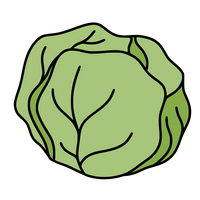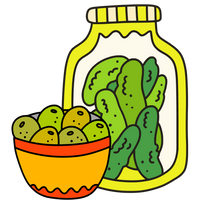
Sure, olives are delicious, salty, and fun to eat, but are olives good for you?
Yes, there are numerous benefits to eating olives! Here are the key benefits:
- Rich in Antioxidants: Help neutralize free radicals, reducing the risk of aging, stroke, cancer, and heart disease.
- Heart-Healthy Fats: Contain monounsaturated fats that improve cholesterol levels and reduce heart disease risk.
- Anti-Inflammatory and Anti-Cancer Properties: Compounds like oleocanthal reduce inflammation and help prevent cancer.
- Probiotic and Fiber Benefits: Some olives provide probiotics for gut health and dietary fiber to support a healthy microbiome.
We love OLIVES here at Olive My Pickle. Our Co Founder, Charlotte walks your though the tastes and flavors available here at OMP. Watch this video for a deep dive into the different options we carry. Ready to try them for yourself? Shop Olives Now.
Here's 10 health benefits of eating olives and why you should feel great about eating more olives every day:
1. Olives are a Powerfully Antioxidant Food
Free radicals cause the plastic to deteriorate, paint to fade, and works of art to degrade. In humans, they contribute to aging and diseases like stroke, cancer, and heart attacks.
Free radicals are molecules within your body with unpaired electrons; they’re on a quest to find another electron and are very reactive and damaging to surrounding molecules.
The neutralizer of the free radical? Antioxidants.
Antioxidants are molecules that can safely interact with free radicals, giving up some of their electrons and neutralizing the free radical. (We like to think that the antioxidant gives the free radical a hug and helps it feel better.)
Olives are an antioxidant-rich food. That means every time you eat them you send an army of good-guy neutralizers into your system to help those bad-guy free radicals chill out. Managing free radicals via intentional intake of antioxidants is a key part of healthy living and olives are a delicious way to do that. (1)

2. Olives are Low in Calories
Olives are not very high in calories. One olive only has about 7 calories. They have a ‘negative calorie load’, which means you burn more calories digesting an olive that you gain eating one. This makes eating olives a very healthy snack.

3. Olives are a Heart Healthy Fat
The predominant fatty acid in olive oil is a monounsaturated fat called oleic acid, making up 73% of the total oil content. The remaining fat content 15% of the fat in olives is saturated fat and 11% is polyunsaturated--omega-6 and omega-3 fatty acids.
The monounsaturated fat found in olives is the same good fat you find in nuts and avocados. Mono-unsaturated fat in the diet increases good cholesterol.
In research studies, diets with increased monounsaturated fats (those that did not become too high in total fat), had participants experiencing a decrease in their blood cholesterol, LDL cholesterol, and LDL:HDL ratio. All of this lowers the risk of heart disease. Good stuff! (2)

4. Olives are one of Nature’s "Smart Drugs"
Olives contain polyphenols, a natural chemical that reduces oxidative stress in the brain. A 2013 study in mice showed that supplementation with olive polyphenols elevates levels of the proteins (known as neurotrophins) nerve growth factor (NGF) and brain-derived neurotrophic factor (BDNF). (3) Both of these play a pivotal role in the growth, development, and survival of brain cells.
5. Olives Are Good for Your Skin.
Beyond their antioxidant properties, which combat free radicals that cause aging, eating healthy olives help skin stay soft and healthy since they also contain vitamin E and vitamin A.
Vitamin E prevents the formation of free radicals which can cause skin diseases while keeping the skin moisturized. In addition, it protects the skin from harmful UV rays and reduces signs of aging. The vitamin E content in olives can also nourish your scalp and increase blood flow to it by aiding in the formation of new blood capillaries.
Vitamin A balances the skin's pH which is essential for healthy, supple, and younger looking skin. Olives help hair too. Eat olives, keep your youthful looks longer (4).

6. Olives Help Regulate Appetite Control
By eating a few olives before a meal, you can take the edge off your appetite. This is because the monounsaturated fatty acids contained in healthy olives slow down the digestion process and stimulate the hormone cholecystokinin, which sends messages of fullness and satisfaction to the brain.

7. Olives are Anti-Inflammatory
Inflammation is understood to be the root cause of diseases, including and eliminating inflammatory foods and replacing them with anti-inflammatory foods is a key first step for anyone on a health journey!
Olives contain anti-inflammatory compounds called oleocanthal which prevent the formation of inflammatory enzymes that could lead to diseases like arthritis and type 2 diabetes. (5) Oleocanthal's strong anti-inflammatory properties mimic the actions of ibuprofen acting as a natural painkiller. (6)

8. Olives Have Anti Cancer Properties
Chronic oxidative stress and chronic inflammation can be key factors in the development of cancer and if our cells get overwhelmed by these, our risk of cell cancer is increased.
By providing us with rich supplies of antioxidants and anti-inflammatory nutrients, olives can help us avoid this dangerous combination of chronic oxidative stress and chronic inflammation.(7)
9. Some Olives Are Probiotic Rich
Some olives are made via the process of natural lactic acid fermentation, resulting in a live-culture food, teaming with good-guy bacteria known as probiotics. Probiotic-rich foods are gut health superfoods and are recommended by leading scientists, doctors, and nutritionists as part of any gut-healthy protocol.
Important to know is that not all olives are live, raw, probiotic foods. Canned olives, and olives found on the dry shelves in your grocery store are pasteurized and therefore not live culture. To shop our entire line of 12+ selections of live culture olives, check out these.

10. Olives are a Good Source of Fiber
Olives pack some dietary fiber, about 1.5 grams per 10 olives. We know now that your microbiome-- that colony of resident good bacteria that live in your body, mostly in your gut, literally subsists on the fiber you eat.
The nourishment of your microbiome is pivotally important to your overall health! Most Americans do not eat nearly enough dietary fiber-- less than half the recommended daily amount of about 30 grams. When combined with a plant-abundant diet, olives (8)
Bonus: Oleuropein and hydroxytyrosol
Oleuropein is unique to olives and you won’t find it anywhere else. It pairs with hydroxytyrosol, the other big, important compound in olives.

Words about sodium.
Nobody’s perfect. Olives are salty, containing about 60 mg of sodium per olive. Through osmosis, you can reduce the saltiness of your olives by replacing a portion of brine with plain water. To read more about salt levels and sodium in fermented food, read our article The Truth About Sodium and Fermented Foods.
How To Eat Olives Everyday
Olives are flavor-packed which makes them an ideal ingredient. Topped on a pizza or added to any salad creates a more flavorful entree. Olives make an easy snack, just by themselves.A small handful of Butter Olives, while you’re doing dinner prep, is a great snack. Adding a few Kalamata Olives to your salad or grain bowl is such a perfect pairing. And don’t forget to serve olives to your guests, Stuffed Olives are widely loved and beautiful and make a popular addition to your charcuterie board. These are just a few easy uses of olives to help incorporate them into your diet. Olives come from olive trees. Check out 9 Amazing Attributes of Olive Trees That Will Humble and Inspire You to be, well, humbled and inspired.
Next steps: fill your fridge with OLIVES.
Not only are olives tasty and a great way to add flavor to your every eating habits, they're also so healthy and good for you. Olive My Pickle has an abundant variety of healthy, salt brined olives for you to choose from. Shop Olives Now.
So if you’re looking for an easy way to improve your overall health, add some delicious olives to your next meal or healthy snack. And don’t forget about all the other fermented foods out there – each one is packed with probiotics that are great for your gut health.
We hope you enjoyed learning about olive health benefits. For more inspiration on how to enjoy fermented foods for optimal gut health, check out our other blog posts & recipe blog.
Cheers to a happy gut!
SOURCES:
https://pubmed.ncbi.nlm.nih.gov/34209636/
https://jamanetwork.com/journals/jamanetworkopen/fullarticle/2717565
https://www.sciencedirect.com/science/article/abs/pii/S0899900712004303
https://www.ncbi.nlm.nih.gov/
https://pubmed.ncbi.nlm.nih.gov/34209636/
https://pubmed.ncbi.nlm.nih.gov/16136122/
https://pubmed.ncbi.nlm.nih.gov/15554560/
https://pubmed.ncbi.nlm.nih.gov/29902436/
https://pubmed.ncbi.nlm.nih.gov/27472350/
https://pubmed.ncbi.nlm.nih.gov/21128831/
https://pubmed.ncbi.nlm.nih.gov/22901687/










